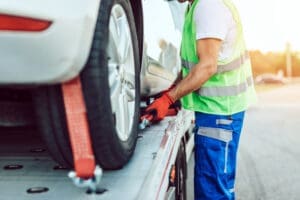Running a towing company is no easy task. Whether you’re a seasoned veteran or just starting in the industry, you know the challenges of managing a fleet of vehicles and towing equipment. We’ve worked alongside many towing companies over the years, so we’ve compiled some information we’ve learned about the importance of maintaining your towing fleet and equipment to minimize risks and maximize profitability.
 How Maintaining Your Towing Fleet Makes Cents (literally!)
How Maintaining Your Towing Fleet Makes Cents (literally!)
Safety First
Safety should always be a top priority for towing company owners and managers. Your fleet of tow trucks and equipment is not just an investment; it’s also a responsibility. Failing to maintain your vehicles and gear properly can lead to accidents and injuries, not to mention potential legal liabilities. Regular inspections and maintenance checks are essential to ensure that your towing vehicles are in optimal condition. This includes checking brakes, tires, lights, and all towing equipment. By keeping your fleet in top shape, you reduce the risk of accidents on the road and protect the well-being of your drivers and others on the road.
Reliability
Towing is a 24/7 business, and your clients rely on you to be there when they need you the most. Vehicle breakdowns or equipment failures can lead to unhappy customers and lost business opportunities. Regular maintenance helps you maintain the reliability of your fleet, reducing the chances of downtime due to unexpected breakdowns. Implementing a preventative maintenance schedule is a proactive way to minimize the risk of unexpected issues. This includes regular oil changes, tire rotations, and inspections. By identifying and addressing potential problems before they escalate, you ensure that your fleet is always ready to respond to calls promptly.
Cost Savings
While it may seem counterintuitive, investing in regular maintenance can save your towing company money in the long run. Routine maintenance is often less costly than major repairs resulting from neglect. When you skip maintenance, minor issues can snowball into significant problems that require expensive repairs or replacements. Moreover, well-maintained vehicles tend to be more fuel-efficient. Properly inflated tires, clean air filters, and well-tuned engines contribute to better fuel economy. As fuel is a significant expense for towing companies, this translates into substantial cost savings.
Regulatory Compliance
The towing industry is heavily regulated, and compliance with safety and environmental standards is mandatory. Failing to meet these requirements for maintaining your towing fleet can lead to fines, penalties, and even the revocation of your operating license. Regular maintenance helps ensure your fleet complies with all relevant regulations, protecting your business from legal troubles. Keep records of all maintenance activities, inspections, and repairs. This documentation can be invaluable in demonstrating your commitment to safety and compliance in case of an audit or inspection by regulatory authorities.
Enhanced Vehicle Lifespan
Towing vehicles are subjected to strenuous conditions, often pulling heavy loads and navigating challenging terrains. Without proper maintenance, the wear and tear on your fleet can accelerate, leading to a shorter lifespan for your vehicles. Replacing tow trucks or equipment prematurely can be a significant financial burden. By investing in regular maintenance, you extend the life of your vehicles and equipment, maximizing their value over time. This means you won’t need to replace them as frequently, saving you money and reducing the environmental impact associated with manufacturing and disposing of vehicles.
Reputation and Customer Trust
In the towing business, reputation is everything. Your customers rely on you during stressful situations like accidents or breakdowns. If your fleet is well-maintained and reliable, you’ll earn the trust and respect of your clients. Word-of-mouth recommendations and positive online reviews can be powerful tools for growing your business. On the other hand, a reputation for unreliable service due to frequent breakdowns or delays can harm your business. Investing in maintenance is essential to uphold your company’s reputation and customer satisfaction.
Insurance Premiums
Insurance is a significant cost for towing companies. Insurance providers often offer lower premiums to companies demonstrating a commitment to safety and risk mitigation. By maintaining your fleet and equipment, you can potentially negotiate lower insurance premiums, saving your business even more money. Additionally, having a well-maintained fleet may help you avoid insurance claims related to accidents caused by equipment failures or vehicle breakdowns. This can prevent your premiums from skyrocketing due to a poor claims history.
Proper maintenance starts with high-quality equipment from Collins Manufacturing.
Maintaining your towing fleet and equipment is not just a necessary expense; it’s a strategic investment in the long-term success of your business. Safety, reliability, cost savings, regulatory compliance, enhanced vehicle lifespan, reputation, and insurance premiums are all affected by the state of your fleet. If you haven’t checked out our Hi-Speed DollyⓇ and Carrier Dolly systems, you’re missing out on one of the best investments you can make in your towing business. Equipping your trucks with our Hi-Speed DollyⓇ and Carrier Dolly systems will make you an employer of choice in your community. Collins Manufacturing has been the industry leader in towing equipment for 45 years. Our Hi-Speed DollyⓇ and Carrier Dolly systems make towing vehicles from even the most challenging situations safe and straightforward for your crew. Our safety ratchet system prevents injuries to employees from slipping grips and prevents the vehicle from dropping. When your workplace and employees’ safety matters, choose Collins. Contact us today to learn how you can implement Collins towing equipment in your company.

Leave a Reply